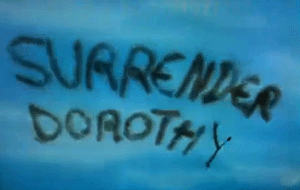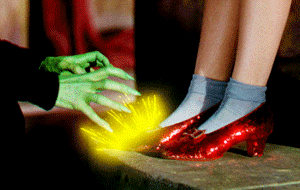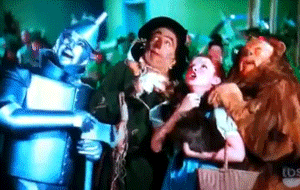|

|
|
The Spirit of Surrender
by Charles Carreon
July 31, 2013

Mark, an insurance defense lawyer in Medford, Oregon,
twitted me once with this line — “I tell people – Charles
Carreon is the best thing that ever happened to the defense
community in Southern Oregon.” By this he meant that since
my arrival in Jackson County I had filed a number of cases
that other lawyers in Southern Oregon would not
touch, providing the “defense community” with work that had
previously been lacking. I guess it was nice of me to
believe in the value of injury and civil rights cases that
all the local lawyers knew weren’t worth the effort to try
in front of the notoriously cheap Southern Oregon juries. I
did get the occasional settlement out of Mark, and he
eventually kicked my ass in the trial of a medical
malpractice case. It was a bad hip-replacement case in
Southern Oregon that I tried before Judge Ray White – a fair
and affable jurist – out of sheer tenacity. My expert was
terrible – he was from California and hadn’t done a whole
lot of testifying, although he had done some hip
replacements. Testifying against a local Oregon sawbones,
and a much better expert, he was not carrying the day, and
about halfway through the third day of trial, Mark was
incredulous. He couldn’t believe I hadn’t thrown in the
towel. But I couldn’t see why I should. I would only lose
faster that way. My client would think he’d been given
away, and I’d lose his respect into the bargain. So I
insisted on hearing the final aria of the corpulent soprano!
Surrender fans will tell you that if you know you’re going
to lose, you shouldn’t waste the jury’s time. Heck with
that! They’re doing more real brainwork than they’ve done
in years. They want to deliver a verdict. Although you can
settle a case during trial, if there’s isn’t a good deal on
the table, why deprive the jury of the pleasure? Besides
which, how do you know you’re going to lose? You don’t know
anything for sure – juries surprise all the time.
Let’s see, any more reasons to surrender? The judge will
think you’re reasonable. That cuts no ice. Judge White
already knew who I was – I’d tried at least a half-dozen
jury trials and scores of bench trials and hearings before
him, so there was nothing about me for him to learn. I was
the prosecutor who at first went over the heads of the
juries, but learned to try a case. Pretty well, actually.
Once, after Phil Arnold and I tried an indecent exposure
case where I was representing the People and Phil was
representing the defendant, Judge White said to the jury,
before sending them to deliberate, something to the effect
of, “I don’t often say this, but you’ve just seen a couple
of really good lawyers at work. This case was extremely
well-presented.” Man, that felt great, and I got the
conviction.
Years later, Phil became a judge, and I tried a non-jury
case for the plaintiff in front of him. My client was the
very beautiful acupuncturist Jennifer Fletcher, a regular
Ashland thief of hearts who was enmeshed in a real estate
deal that had turned out rotten. Literally, like her house
was rotten – you could punch through the walls with your
fist, or kick a hole in it, and inside the walls was like
old newspapers and crap. It was the worst “Oregon
construction” you have ever imagined. But the case turned
on documents, and in particular, a statement of Jennifer’s
that we couldn’t weasel out of, and Phil ruled for the real
estate agent. Now, I didn’t agree with the ruling. But I
will tell you with one hundred percent certainty that I
never thought “This is payback for kickin’ his ass in that
indecent exposure case.” Nor did I think I might have an
edge because I had contributed to Phil’s campaign and hosted
a memorable event (he will smile if he reads this) at my
office to support his candidacy. Because I knew Phil’s
lawyerly character, and he knew mine. What Phil knew about
me as an advocate, a judge, and a friend was that I had the
type of character that allows a man to present a case to a
jury, and receive the judgment. If you try cases
repeatedly, you will develop a trial lawyer’s character,
which means you will learn to do everything you can and then
let go so the jury can finish the job. Because only they
can give your client the verdict.
The time when the matter is in the jury’s hands is a time of
almost unbelievable tension. This is the fruit of not
having surrendered – massive uncertainty. I have, on one
occasion, known with unshakeable certainty that I was going
to win a case. On every other occasion, I had to wait to
hear the verdict. And that wait is like no other. Talk
about “out of your hands.” It’s so bad, that I made it a
practice to bring a basketball and shoot hoops with my
client and co-counsel if I was lucky enough to have one.
I remember once, Peter Carini and I shot hoops with the
client in a drug case where our client could have been
nailed on three deliveries and one possession. Nacho, the
client, had an innocent dupe defense, and played it with
mastery, being as he was a handsome Tae Kwon Do black-belt
family man. The trial had gone well, with some humiliating
reversals for the prosecution, but when you’re facing four
felonies, there’s testimony from informants, and video of
the client at the scene of the third delivery, how you gonna
beat all that? So shooting hoops will keep you from going
insane between the time when you say “the defense rests,”
and the judge says, “I have received the verdict from the
bailiff, and it reads ….” We spent several hours playing
“h-o-r-s-e” before my cellphone rang, and we walked back to
the courthouse.

We knew the jury had something good for us, because they had
the windows open upstairs in the jury room and they were
leaning out the window smokin’ and laughin’ and you know you
don’t feel that way when you’re convicting the hell out of
somebody. We walked in and the jury looked well satisfied
to find him not guilty on all deliveries, and guilty of
possessing the ounce in the freezer. A few years later we
would shake that charge on appeal. Mighty fine result you
couldn’t have got from a surrender, which was all you could
have gotten from most lawyers. Because, they’ll say,
“You’re guilty! How you gonna beat four charges? THIS IS A
GREAT DEAL!”
The average public defender consumes and serves his clients
a daily diet of surrender. The guys in jail in Southern
Oregon called their appointed lawyers “dumptrucks.” They
just deliver their clients to the dump, like garbage. They
can always tell their clients why they will lose if they go
to trial. They doubt whatever their clients tell them; they
fail to interview witnesses; they accept the spin the
prosecutor puts on the facts. They do their job as it’s
explained to them, and get their client to plead guilty to
something that will take the case off the docket. They
advocate surrender.
The spirits of lawyers who advocate for surrender become
shrunken and unimpressive. They are filled with cautions
and limitations. I find such people without charm or
appeal. I know from the firsthand testimony of their
clients that their clients do not like them, and hold them
in contempt. Having witnessed that contempt, I would never
want to be the subject of it. And having felt the gratitude
of clients who felt well-represented even though their trial
ended in an adverse result, I have come to appreciate that
sense of reward for a contest well-fought, separate and
apart from the nominal outcome.

What do the advocates of surrender use to sell their
product? Fear. Just fear. A lawyer learns how to sense
and play upon individual fears. Since every person is a
bundle of fears, you can play them all together to create a
real sonata of anxiety, and drive people right into the
chosen course of action. Some people have big fears about
family, others about money, others about self-image and
honor. You name it, their fears are evident, especially
when you can tell them, “Everything is confidential, and I
must know the truth.” When they lie, it tells you more
about their fears than when they tell the truth. And of
course, everyone fears most what they most adamantly claim
they do not fear at all. That’s why so many people claim
they don’t fear death.
Manipulating people with fear is pretty low, though. I
don’t like to do it unless they are so lacking in wit that I
cannot get the job done with reason and teamwork. I like to
make my client a partner in the process of solving their
problem. Two heads are better than one, and we each supply
different parts of the equation. Together, we try and reach
the solution that they want. If that’s impossible, I try
and help them figure out how close we can get. Then we put
the plan into action, and try and secure the best result.
It’s actually pretty fun work, helping people get what they
want, instead of scaring them into accepting what they don’t
want.
In order to increase the amount of fear people feel, those
who would manipulate them will always overstate the benefits
of surrender. They will make it seem like something good
will happen if you surrender. But when you look at the
histories of those who have surrendered to the
Rapeutationists, who have kissed the hem of Popehat’s
shit-stained robe, you see that they gained only further
derision and enhanced abuse for their pains.

So when I scan the comments of those who marveled at my
tenacity, and hooted in my direction as I “doubled, tripled,
and quadrupled down,” calling me a fool for not
surrendering, I enjoy the pride of having frustrated their
expectations, and the satisfaction of knowing that, by their
own admission, they would never have the guts to be me.
Their advice is the advice that cowards and tyrants give,
but I saw the Wizard of Oz, and I know what happens to the
witch who screams “Surrender!”
|